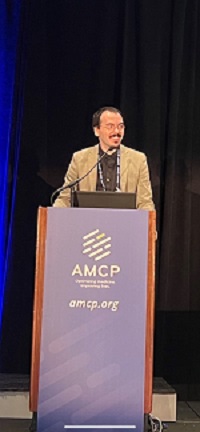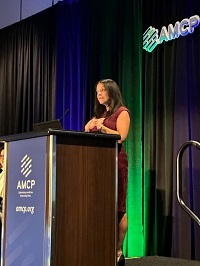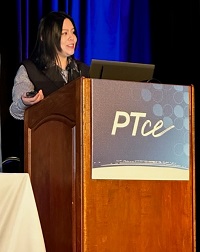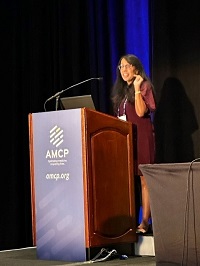Perspectives
AMCP Nexus 2023 Live-Blog: Day 1 Collection
October 17, 2023

Nick Friedlander, Clinical Program Pharmacist
Behind the Research with Nick Friedlander
Once again, Prime/Magellan Rx researchers had simultaneous presentations to end day one of AMCP Nexus, but we were able to catch-up with Nick Friedlander, PharmD, Clinical Program Pharmacist, after of his presentation, “Award-Wining Research Supporting the Managed Care Pharmacy Research Agenda.”
Prime: What inspired this research, and as you developed this presentation, what stood out to you?
Nick Friedlander (NF): The research was inspired by the success we observed with a specific rule type (incretin mimetic duplicate therapy) since we added the category to HighTouchRx® approximately a year and a half ago. The driving force behind the introduction of this category was twofold: first, growing utilization of GLP-1 agonist drugs and second, lack of prescriber awareness of relevant guidelines concerning co-prescribing of GLP-1 agonist and DPP-4 inhibitor drugs.
Prime: As you know, AMCP’s mission is to improve access to therapies and reduce costs for patients. How does this research achieve these aims?
NF: Simply put, this rule drives discontinuation of minimally effective, and non-cost effective therapies. By optimizing the diabetes regimen from two duplicative therapies to a single agent, we reduce member and client cost share and enhance access through containment of the total cost of managing diabetes therapies.
Prime: AMCP Nexus is an industry conference, but what should average consumers know about this presentation?
NF: Managed care pharmacists are effectively leveraging integrated medical and pharmacy claims data to save our members and clients money, while also promoting adherence to guideline-based prescribing.
Prime: As you look toward the future, how might this topic and research of the issue evolve?
NF: Alternative management strategies, including enhanced utilization management criteria or concurrent drug utilization review (cDUR), could effectively drive the same behavior change upstream. I would also be interested in exploring, at some point in the future, health outcomes of members who were effectively steered to monotherapy versus those who continued using duplicative therapies after a managed care pharmacist intervention attempt; this could provide additional real-world evidence to support this intervention whether that is a soft-steer strategy (like HighTouchRx) or hard-steer (hard reject DUR). At a higher level, I anticipate continued research demonstrating the value of managed care pharmacist-led intervention programs as we have already presented on their efforts in addressing medication stockpiling (previously presented on cystic fibrosis drug stockpiling) and duplicate therapy, and I will hopefully be presenting on multiple sclerosis brand to generic interventions at next year’s AMCP annual conference. Lots of exciting stuff on the horizon!

Simone Ndujiuba, Product Development Director, Clinical Oncology
Behind the Research with Michelle Booth & Simone Ndujiuba
Rounding out a full day of programming at AMCP Nexus 2023, Michelle Pannone-Booth, PharmD, Senior Director of Clinical Account Services, and Simone Ndujiuba, PharmD, BCOP, Product Development Director, Clinical Oncology, took the stage to present their research, “Managed Care Oncology Perspectives: CAR T-Cells vs. BiTEs.”
Science has worked to harness the immune system to fight cancer for decades, but in 1987, Zelig Eshar engineered the first Chimeric Antigen Receptor (CAR) to help open a new front in oncology. CAR therapy uses re-engineered cells extracted from a patient that are re- engineered, infused back into the body and then attack cancers, and since 2017, six new CAR-T agents have been approved by the FDA.
At this time, it can take 10 to 14 days to extract T cells from a patient; work is underway to shorten this, including T-Charge and FasT CAR, which require fewer cells to manufacture the therapy.
As Ndujiuba explains, there’s a need to understand a patient’s journey, which often includes bridge therapy to help the patient to prep for treatment, including chemotherapy, to aid the CAR-T infusion process. However, some patients don’t respond to therapy.
Another option is BiTE therapy, which was first constructed in 1985, which targets antigens, turning on the T cells to fight cancer cells. This therapy can be administered to patients with no down time. Eight therapies have been approved by the FDA since 2018.

Michelle Pannone-Booth, Sr Director, Clinical Account Services
The patient journey is simpler with this therapy, and typically includes maintenance therapy, which can take place on a weekly schedule. But it also has a lower response rate than CAR T therapy.
Both therapies are expensive, but similar in price. Unfortunately some providers are not including CAR-T and BiTE therapies in coverage plans.
But new frontiers are being explored with these therapies, with more than a dozen additional BiTE and CAR-T drugs in the pipeline. And as Booth notes, managed care strategies are also taking shape that may bring these therapies to potentially more patients. No surprise, but adherence and drug waste are pieces to the puzzle, she adds.
Enhanced utilization management is key when managing high-cost drugs. Booth shares that having an internal expert to manage cases and develop policies, or having a specialty-matched physician on hand to support CAR-T and BiTE therapies can help payers navigate this dynamic topic.

YuQian Liu, Sr Director, Clinical Account Services
Behind the Research with YuQian Liu
It has been a busy start to AMCP Nexus, and the afternoon was no exception as YuQian Liu, PharmD, Senior Director of Clinical Account Services with Magellan Rx, presented her session, “Improving Treatment Access for Spinal Muscular Atrophy: How Managed Care Strategies Can Ease Clinical and Caregiver Burden,” to a standing-room-only space.
Individuals with spinal muscular atrophy (SMA) face numerous challenges in their treatment, but the disease also has a tremendous impact on the lives of those who help care for them, as well.
SMA is a disorder of motor neurons and can occur in one in 10,000 live births, often affecting individuals with no family history. The disease can manifest over time and severely impact motor and respiratory function, but also life expectancy. Only 8% of patients survive past 20 months in severe cases. And from time of diagnosis to signs of disease in some individuals, it can be a matter of days or weeks, so urgent treatment is crucial.
New gene modifying therapies — which are expensive — and enhanced screening programs, have changed the treatment landscape. But the economic impact of the therapies is only the start, particularly when families may need to travel or take extended time away from work for treatments.
As Dr. Julie Parsons, an SMA clinician and pediatric neurologist, explained, earlier diagnosis leads to earlier treatment and better outcomes. What’s more a robust managed care strategy can make a further impact.
When deploying managed care programs for SMA, Liu explains that the key is knowing what to watch for. Treatments for SMA are not only expense, but also new, meaning that physicians and managed care professionals are in uncharted territory. But a more coordinated approach with medication, acute care, and rehab that puts patients and their families at the center can improve lives dramatically.
Liu also shares that we need more data, particularly for caregiver burden and quality of life comparisons, and researchers will need more follow up data as patients age and it becomes easier to see the quality of life impacts.
She also explained that making the prior authorization process smoother, working with providers to ease age restrictions for therapies, and putting more definition around when treatment can begin will also improve health outcomes.
“The industry does need to move forward [to better understand] these orphan diseases,” Liu said.
Dr. Parsons also shared videos of a few of her patients who had been successfully treated for SMA, walking down clinic corridors, noting that while more quality of life data is needed, the smiling faces of her patients helps tell the story.

Sneha Sharma, Director, Medical Pharmacy Strategy
Behind the Research with Sneha Sharma
AMCP Nexus began day one with simultaneous presentations by Prime and Magellan Rx researchers. We were able to connect this morning with Sneha Sharma, Director, Medical Pharmacy Strategy, ahead of her presentation “Rare Disease Spotlight: Hereditary Angioedema Treatment Advances, Patient Value, and Access to Care.”
Prime: What inspired this research, and as you developed this presentation, what stood out to you?
Sneha Sharma (SS): Actually, this research originated with a grant proposal from AMCP, who connected with us to see if there was interest to speak with a HAE physician, and the head of the HAE association. This seemed to me an important opportunity to highlight the role managed care pharmacists have collaboratively with other specialists to allow for specialized disease state patients to receive safe and effective therapy.
Prime: As you know, AMCP’s mission is to improve access to therapies and reduce costs for patients. How does this research achieve these aims?
SS: We discuss opportunities for preferencing, dose optimization, and ensuring the patient therapy is meeting their needs for optimal outcomes. Proper dosing leads to less drug and lower costs for the patient to obtain.
Prime: AMCP Nexus is an industry conference, but what should average consumers know about this presentation?
SS: In a nutshell, specialty medications are continuing to grow and are we going to continue to see targeted medications for rare diseases.
Prime: As you look toward the future, how might this topic and research of the issue evolve?
SS: The pipeline is growing for this disease state, so I expect to see more data and more targeted clinical trials. Overall, this opportunity highlights our commitment to provide education and work with industry partners.
Behind the Research with Ben Urick & Kyle Verley
Anticipation was high for the start of 2023 AMCP Nexus in Orlando this morning, where Ben Urick, PharmD, PhD, Principle Health Outcomes Researcher at Prime, and Kyle Verley, MA, MBA, Director of Network Management at Prime, kicked things off with their session, “Medically Integrated Dispensing Services: Creating Value for Payers and Providers.”
Over the last decade, medication costs have increased, but much of that has been driven by the rise in specialty products. Even though they comprise only 3% of total prescription volume, specialty products account for 51% of spend. This naturally opens an opportunity for improving access and costs for patients, which also is the AMCP mission.
In order to find value, it’s important to define it first, and as Urick noted, value is found when you divide quality by cost. He also noted that quality is measured by time to therapy initiation, clinical outcomes, and member and provider experience; cost includes measures like cost of goods sold/net costs, drug waste and total medical spend.
Much of the evidence in this research comes out of oncology, which is key given that high rates of adherence, clinical outcomes and patient satisfaction— among other measures — are crucial.
As Verley noted, developing an integrated pharmacy model is about creating an ecosystem with the physician, pharmacist and patient. When done right, many aspects of the treatment journey can improve. For example, a successful integrated model may reduce drug fill times dramatically, which can take up to 10 days in a traditional model. But reduced fill times also can lead to improved adherence and reduced drug waste.
Therapy monitoring is also an important aspect of this model, which can provide patients with adherence support, improved targeting of therapies, and identify patient treatment gaps.
The presenters also discussed bringing in concepts like Net Promoter Scores (NPS) into the mix. NPS is a market research metric that is based on asking respondents if they would recommend a company, product, or a service to a friend or colleague. As Verley explained, making sure that patients are not only healthy, but feel that they’ve had a good experience, should be a key quality measure.
Related news
Perspectives
July 25, 2024
Quarterly Drug Pipeline: July 2024
Clinical insights and competitive intelligence on anticipated drugs in development
Perspectives
July 22, 2024
Oncology Insights: 2024 ASCO Annual Meeting key findings
Findings from this year’s American Society of Clinical Oncology (ASCO) Annual Meeting will likely lead to clinical practice changes and U.S. Food and Drug Administration (FDA) drug approvals or expansions
Perspectives
July 16, 2024
LISTEN NOW: Beyond the business – Stories of corporate kindness | Pharmacy Friends Podcast
In this episode, we talk about how our employees' help goes beyond our work in health care, aiding in philanthropic efforts